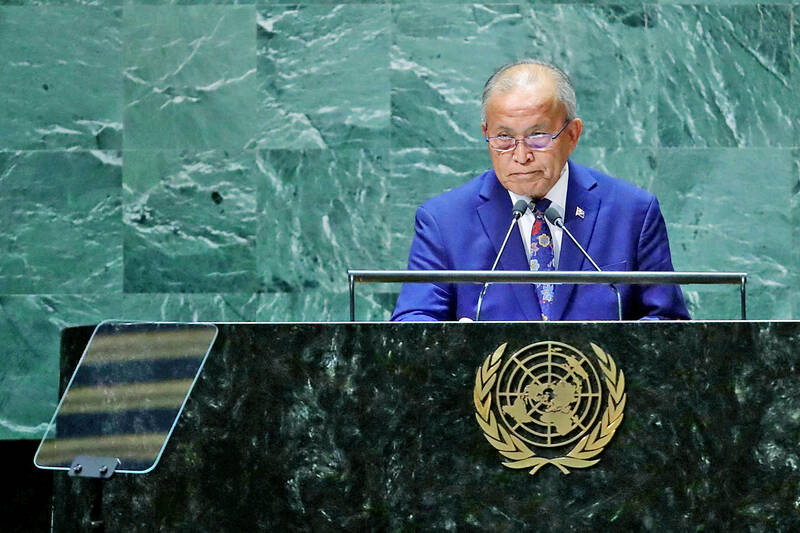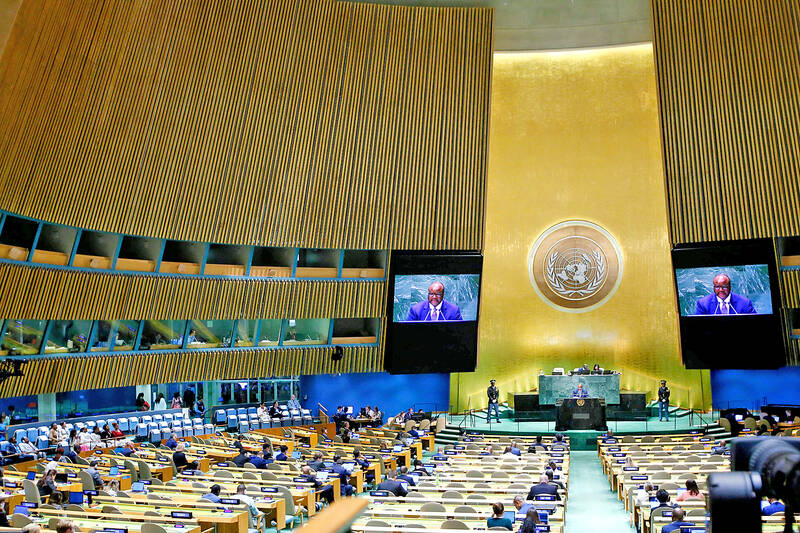Marshall Islands President David Kabua on Wednesday called on the UN to rescind its interpretation of Resolution 2758, which bars Taiwan from participating in the international organization.
There is still a “visible crack” in the UN, as it “will never be whole and complete without the meaningful participation of the 23 million people of Taiwan,” Kabua said in his address on the second day of the General Debate at the 78th General Assembly in New York.
He also criticized the UN’s specialized agencies, meetings and mechanisms for what he described as their continuous efforts to close the doors to journalists and visitors from Taiwan.

Photo: AFP
The root of the problem is that the “UN bureaucracy” continues to stick to a “wrongful misinterpretation of Resolution 2758,” using it to bar UN engagement with the people of Taiwan and their democratic system, he said.
“We must have the courage to recognize the reality of the present situation and relegate this outdated dogma to the vaults of history,” said Kabua, whose Pacific island nation has been a diplomatic ally of Taiwan for 25 years.
Taiwan left the UN in 1971. Resolution 2758, which was adopted by the UN 26th General Assembly in 1971 to resolve the issue of China’s representation, recognizes the People’s Republic of China (PRC) as the “only lawful representative of China,” but does not mention Taiwan and does not state that “Taiwan is part of the PRC,” as China claims.

Photo: AFP
King Mswati III of Eswatini, Taiwan’s only diplomatic ally in Africa, also voiced his support for Taiwan’s inclusion in the UN in his address on Wednesday.
“Sustaining the SDGs [Sustainable Development Goals] will require that member states develop innovative financing strategies to ensure that implementation reaches those most left behind,” King Mswati said.
“At this critical juncture, including Taiwan is an essential next step if we are to successfully achieve the 2030 Agenda for Sustainable Development,” he said. “We call for Taiwan’s inclusion in the United Nations system, which encompasses participation in meetings, mechanisms and activities that pertain to the implementation of the Sustainable Development Goals.”
Doing so would not only improve global cooperation and partnership, but also emphasize the principle of ensuring that “no one is left behind,” he said.
The day before, Belizean President John Briceno also emphasized Taiwan’s role in helping further the SDGs.
“The SDGs is a collective commitment. Taiwan and other partners are supporting our pursuit, and we call on others to join us in inclusivity, equity and solidarity,” Briceno said.
The 78th General Assembly began on Sept. 5 at the UN headquarters in New York and the General Debate is being held until Tuesday next week.
Separately, Representative to the US Hsiao Bi-khim (蕭美琴) in a USA Today op-ed on Wednesday reiterated a call for the UN and international organizations to permit Taiwanese participation.
Detailing the ways in which the UN has misinterpreted Resolution 2758 to shut Taiwan out of the organization and its bodies, such as the WHO, Hsiao wrote that “the people of Taiwan resent this discrimination.”
“There is an urgent need to stop Resolution 2758’s misinterpretation, which has not only damaged the rule of law within the United Nations, but also silenced the voices of the Taiwanese people,” she wrote.
“The United Nations should bear in mind that it is ruled by the peoples, not by authoritarian regimes,” she said, quoting from its founding charter.
“The legitimacy and moral authority of the United Nations to use its power is lawful only when consented to by the peoples over which that political power is exercised,” she added.

A Ministry of Foreign Affairs official yesterday said that a delegation that visited China for an APEC meeting did not receive any kind of treatment that downgraded Taiwan’s sovereignty. Department of International Organizations Director-General Jonathan Sun (孫儉元) said that he and a group of ministry officials visited Shenzhen, China, to attend the APEC Informal Senior Officials’ Meeting last month. The trip went “smoothly and safely” for all Taiwanese delegates, as the Chinese side arranged the trip in accordance with long-standing practices, Sun said at the ministry’s weekly briefing. The Taiwanese group did not encounter any political suppression, he said. Sun made the remarks when

The Taiwanese passport ranked 33rd in a global listing of passports by convenience this month, rising three places from last month’s ranking, but matching its position in January last year. The Henley Passport Index, an international ranking of passports by the number of designations its holder can travel to without a visa, showed that the Taiwan passport enables holders to travel to 139 countries and territories without a visa. Singapore’s passport was ranked the most powerful with visa-free access to 192 destinations out of 227, according to the index published on Tuesday by UK-based migration investment consultancy firm Henley and Partners. Japan’s and

BROAD AGREEMENT: The two are nearing a trade deal to reduce Taiwan’s tariff to 15% and a commitment for TSMC to build five more fabs, a ‘New York Times’ report said Taiwan and the US have reached a broad consensus on a trade deal, the Executive Yuan’s Office of Trade Negotiations said yesterday, after a report said that Washington is set to reduce Taiwan’s tariff rate to 15 percent. The New York Times on Monday reported that the two nations are nearing a trade deal to reduce Taiwan’s tariff rate to 15 percent and commit Taiwan Semiconductor Manufacturing Co (TSMC, 台積電) to building at least five more facilities in the US. “The agreement, which has been under negotiation for months, is being legally scrubbed and could be announced this month,” the paper said,

MIXED SOURCING: While Taiwan is expanding domestic production, it also sources munitions overseas, as some, like M855 rounds, are cheaper than locally made ones Taiwan and the US plan to jointly produce 155mm artillery shells, as the munition is in high demand due to the Ukraine-Russia war and should be useful in Taiwan’s self-defense, Armaments Bureau Director-General Lieutenant General Lin Wen-hsiang (林文祥) told lawmakers in Taipei yesterday. Lin was responding to questions about Taiwan’s partnership with allies in producing munitions at a meeting of the legislature’s Foreign Affairs and National Defense Committee. Given the intense demand for 155mm artillery shells in Ukraine’s defense against the Russian invasion, and in light of Taiwan’s own defensive needs, Taipei and Washington plan to jointly produce 155mm shells, said Lin,